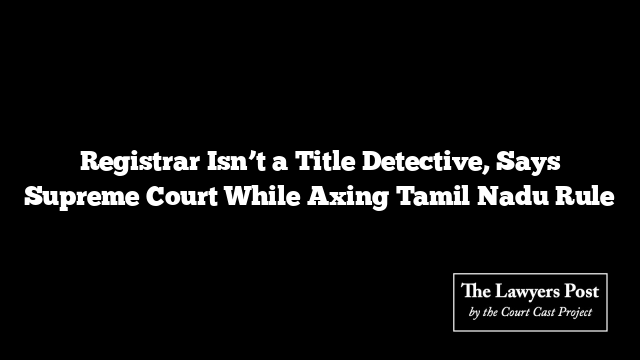In a sharp reminder of where authority ends and overreach begins, the Supreme Court has ruled that officials registering property documents under the Registration Act, 1908 aren’t in the business of vetting ownership claims. If you show up with the right paperwork, pay the required fees, and meet procedural requirements, your document gets registered—whether or not you own the land you’re trying to sell.
That may sound paradoxical, but the Court says it’s exactly what the law prescribes.
In a ruling that struck down Rule 55A(i) of the Tamil Nadu Registration Rules, the top court declared the requirement for producing previous title deeds and encumbrance certificates before registration as ultra vires—essentially, out of bounds of the parent law. The rule, the Court said, veered off course from what the Registration Act actually empowers authorities to do.
The judgment came from a bench led by Justices Abhay S. Oka and Ujjal Bhuyan, who dismantled the state’s logic point by point. According to them, the role of the Sub-Registrar is not to play courtroom judge over ownership disputes. Their job is simple: confirm that both parties are present, agree that the document was executed willingly, and ensure formalities are complete.
“Even if someone sells or leases land they technically don’t own,” the Court clarified, “as long as they tick all procedural boxes and pay the required stamp duty and fees, the Sub-Registrar has no legal reason to block the registration.”
Translation: registration is not an endorsement of legal title. If someone without ownership signs a deed, the document only transfers what rights—if any—they actually have. Nothing more, nothing less.
The Court also pointed out that the Registration Act doesn’t hand over any power to officials to probe into ownership or demand title proof. Not in Sections (a) to (j) of Section 69. Not anywhere. Rule 55A(i), therefore, tried to create a hurdle the parent Act never intended.
The legal battle began when a petitioner, relying on an unregistered will, attempted to register a sale deed in his name. The Sub-Registrar shut it down, citing the petitioner’s failure to include legal heirs and failure to prove ownership under Rule 55A. That rejection took the petitioner first to the Madras High Court—and eventually, to the Supreme Court.
In its final word, the Court reinforced a fundamental principle: registration is an administrative act, not a judicial one. Trying to turn registrars into title checkers only leads to arbitrary denials—and that’s exactly what the Constitution doesn’t allow.
Meanwhile, back at the Madras High Court, a similar sentiment echoed recently, with the court asserting that Rule 55A lacked any statutory muscle and was merely being used to obstruct document registration at will.
Bottom line: registration is about process, not property disputes. If there’s a real conflict over ownership, take it to court—not the Registrar’s desk.





